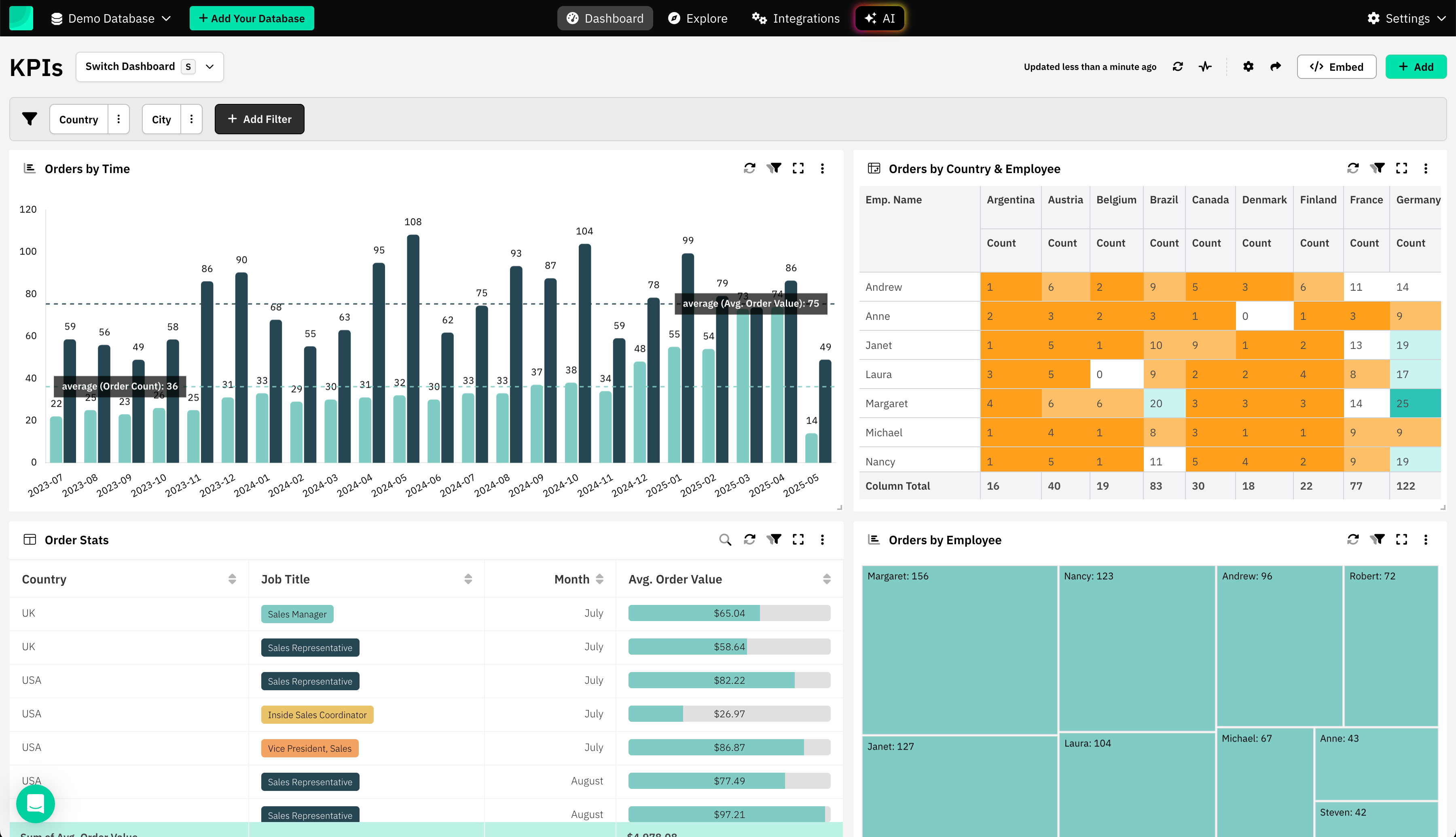6 best Looker alternatives
Looking for Looker alternatives? Explore top BI tools with advanced analytics, seamless integrations, and affordable solutions to transform your data insights.

As organizations rethink their BI strategy due to cost, complexity, technical dependencies, or visualization needs, it’s time to explore robust alternatives to Looker. Below is a curated selection, beginning with Draxlr and followed by notable contenders.
This guide also highlights what makes each option unique so that teams can match their priorities with the right tool more easily.
1. Draxlr: Self-Service, AI Insights, No-code BI
Draxlr stands out as a self-hosted or cloud-ready BI tool designed for intuitive SQL-driven analytics:
- Fully self-hosted via Docker, giving teams complete control over data, infrastructure, and compliance.
- Supports many databases such as PostgreSQL, MySQL, Redshift, Snowflake, BigQuery, Supabase, and more.
- Offers visual and AI-assisted SQL querying with a drag and drop builder, real-time results, versioned queries.
- Dynamic dashboards with pivot tables, charts, drill down or through, filters, embedded analytics (React and Vue friendly).
- Alerts via Slack or email, scheduled reports, query audit logs, granular permission controls.
- Competitive pricing starting around $75/month for 20 users or $500/month self-hosted.

2. Zoho Analytics: Intuitive, AI Powered, and Cost Effective
- Drag and drop UI with strong visualization options and AI assistant “Zia,” enabling natural language queries, anomaly detection, predictive insights.
- Over 500 native connectors and automated data blending.
- Available on cloud, on-premises, or embedded deployment.
- Pricing starts at about $8 per user per month with a free plan.
3. Holistics: Analytics as Code with Semantic Modeling
- Architecturally similar to Looker with semantic modeling and modeling as code.
- Ideal for teams needing centralized definitions, reproducibility, consistency across dashboards.
4. ThoughtSpot: AI Augmented, Search First Analytics
- Search-based interface with generative AI (Spotter) that lets users query data using plain language.
- Real-time dashboards, proprietary modeling language (TML), embedded analytics.
- Excellent for natural language access and AI insights.
5. Tableau: Visualization Leader with Deep Customization
- Exceptional range of chart types, storytelling, interactive dashboards.
- Steeper learning curve and pricing, but unmatched for advanced visualizations.
6. Qlik Sense: Associative Engine for Data Exploration
- Uses associative data modeling for intuitive exploration across related tables.
- Strong for discovering hidden relationships in complex datasets.
Comparison Snapshot
| Use Case or Priority | Recommended Alternative | Why It Fits |
|---|---|---|
| AI-assisted query with self-host or cloud | Draxlr | SQL plus AI support, flexible deployment, strong support |
| Natural language insights with AI | ThoughtSpot | Search-first interface, AI dashboards |
| Drag and drop ease at low cost | Zoho Analytics | Intuitive UI, Zia assistant, affordable |
| Semantic modeling and code-based governance | Holistics | LookML-like modeling without Looker |
| Visualization depth and storytelling | Tableau | Diverse charts, interactivity, polished design |
| Exploring complex data associations | Qlik Sense | Associative engine, embedded options |
| Open-source and flexible frameworks | Metabase, Omni, others | Community-driven, customizable |
Final Thoughts
- Draxlr is the top pick when it comes to combining AI features, SQL flexibility, self-hosting options, and affordability.
- ThoughtSpot excels for natural language querying and AI-augmented dashboards.
- Zoho Analytics works well for teams wanting simplicity and low cost.
- Holistics, Tableau, and Qlik Sense remain strong choices depending on your needs for modeling, visualization, or exploratory analytics.
FAQs
1. What is better than Looker?
Draxlr is a strong Looker alternative, designed to empower every team member with actionable insights. As a self-service data analysis tool, it enables your team to explore and learn from data without requiring SQL expertise.
2. What are the drawbacks of Looker?
Looker has a steep learning curve, a complex setup process, and is comparatively more expensive than some of its alternatives.
3. Is Looker or Tableau better?
Choose Looker if your focus is on advanced data modeling, scalability, and embedding analytics, and choose Tableau if you prioritize ease of use, interactive dashboards, and a visually rich BI experience. If you’re exploring more Looker alternatives, try Draxlr, it offers the best of both worlds.
4. Is there an affordable alternative to Looker?
You can consider Draxlr, it is very affordable compared to Looker. It is ideal for small to mid-sized companies, and it also has great customer support.

